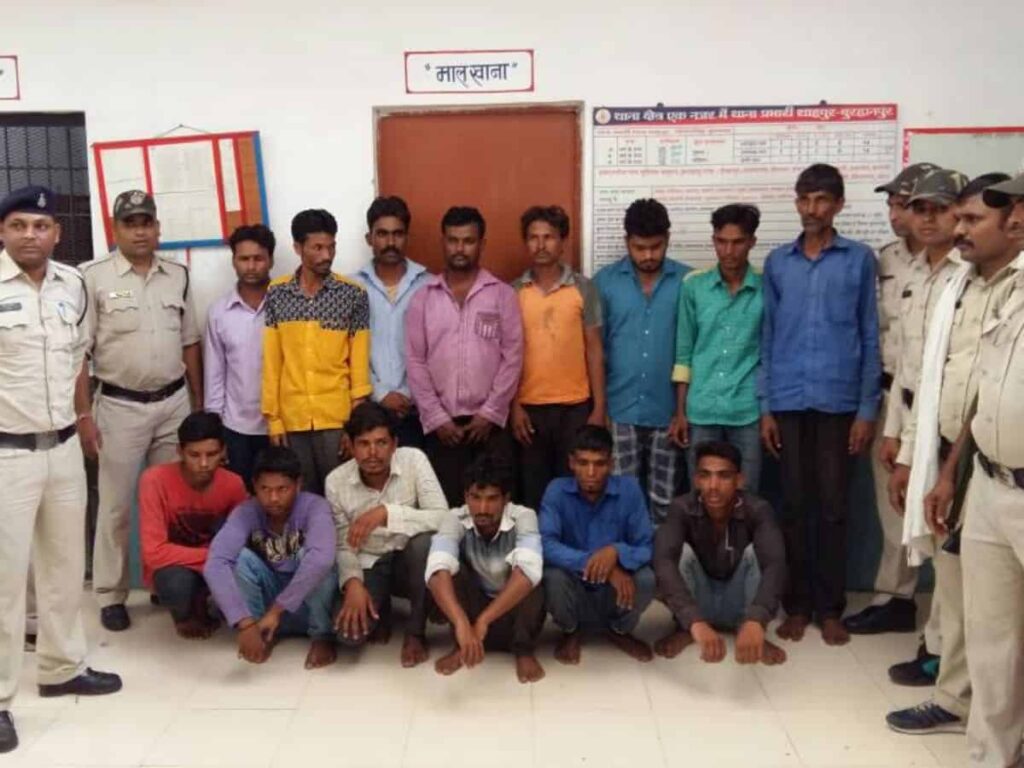Six years after a group of 17 Muslim men, including two minors, who were wrongly accused of celebrating Pakistan’s victory in a cricket match in June 2017, a Madhya Pradesh court found that the case was fabricated as the complainant and government witnesses said police forced them to make false statements, Article 14 reported.
Interestingly, the court did not hold Madhya Pradesh police accountable for registering a fake case.
What happened?
On June 18, 2017, the Indian national cricket team lost the ICC Champions Trophy final to Pakistan. On the same day, a rumour spread amongst the residents of Mohad village in Madhya Pradesh that some members of the Muslim community distributed sweets and burst crackers to celebrate Pakistan’s victory.
Mohad village, located on the Madhya Pradesh-Maharashtra border, has a substantial population of Dalits, Bhil tribals, and Tadvi Bhil Muslims, a subcaste of the Bhils who converted to Islam. A majority of the population work as daily-wage labourers.
Seventeen Muslims, including two minors, were arrested by the MP police. Initially booked under sedition and criminal conspiracy, the police dropped the sedition charge and slapped Section 153 (A) (promoting enmity between different groups on grounds of religion, race, place of birth, residence, language, etc).
Who filed complaint?
Subhash Koli
According to the Article 14 report, police pressed the charges even as the complainant Subhash Koli insisted he did not lodge any complaint.
According to Koli, on June 18, he had gone to release his Muslim friend from police custody. “They asked me, ‘A Hindu has become friends with a Muslim?’ and hit me twice on the back of my head,” Koli said in an interview with Scroll.in. He said he was scared and police made sign a false report.
Three months before the verdict, Koli succumbed to cancer.
Six years of torture, humiliation
In 2017, the Bharatiya Janata Party (BJP) had been in power for three years at the Centre. Hindu nationalism was rising at a dangerous speed, and the term “anti-national” was freely used against critics, especially Muslims. The mainstream media was playing the government narrative and spreading fake news against minorities.
The arrested men said they were tortured physically and mentally after their arrest.
During the police custody in Shahpur police station, they alleged, officials kicked them, humiliated them, pulled their beards, and threatened to set it on fire if they protested. They were starved for days.
After two days of police torture, the men were shifted to Khandwa Central Jail, where they were made to clean toilets everyday.
During court hearings, the men would hears “Desh ke gaddaron ko, goli maro salon ko” (Shoot the traitors) and “Atankwadiyon ko phansi do” (Hang the terrorists).”
“For six years we spent Eid on empty stomachs while back home our families ate dry bread,” said one of the men.
Unable to bear the humiliation, 40-year-old Rubab Nawab took his own life inside the jail in 2019. He consumed poison. He is survived by his wife and two children.
His older son, now 18 years old, left school as the family reels under debt. He now works as a daily wage labourer.
“Two policemen entered the house and assaulted him after hearing his (Rubab Nawab’s) name. When both the children started crying, they abused them, saying, ‘Chup ho atankwadi ke aulad warna yahi khatam kar dunga.’” (Shut up, you son of a terrorist, or else you will be killed.),” Nawab’s wife Zubaida Bai recalled the fateful day when he was nabbed by the cops.
Police refutes torture allegations
Police have refuted the allegations stating that “nothing was reported in the mandatory medical examination before the accused were moved to jail.”
However, another man among those who were arrested claimed, “There was no medical examination conducted.” He said he was playing with his infant daughter when the police came to his house. They threw my child aside and said, “Saale iss desh ka namak kha kar gaddari karta hai,” (You live in India but are a traitor).”
Imam neither had a smartphone nor a television at home. “We don’t have money for food. Who can afford to burst crackers and distribute sweets after watching a match on TV,” he said.
Repercussions
Neither did the acquitted men receive any compensation nor did the court pull up the police for framing them in a false case that led to their six-year incarceration.
Out of the 17 arrested, two were minors – Mubarik Tadvi and Zubair Tadvi, both of whom were 16-year-old at the time of their arrest.
They were acquitted by the juvenile court in 2022. “I used to dream of becoming a police officer. Now I have no such dreams. I have given up education,” Zubair said.
Sikander Tadvi, whose 60-year-old father Mukaddar killed himself in 2021, was anguished that he did not live to see him acquitted. “He didn’t want to live with that tag of terrorist and traitor,” he said. “At least he would have died in peace.”
Nawab’s wife Zubaida Bai said the tag of a ‘traitor’ mentally affected her husband. “He was devastated with day-to-day humiliation and the tag of traitor. He used to cry after returning from the police station and the court,” she was quoted in Article 14.
The BJP used the incident in their favour to attract voters in the name of patriotism ahead of the 2018 Madhya Pradesh Assembly elections. BJP won and Shivraj Singh Chauhan was elected as its chief minister.
The arrests of 2017 have left an impending scar on the villagers in Mohad, where nobody watches cricket matches now.
Get the latest updates in Hyderabad City News, Technology, Entertainment, Sports, Politics and Top Stories on WhatsApp & Telegram by subscribing to our channels. You can also download our app for Android and iOS.
